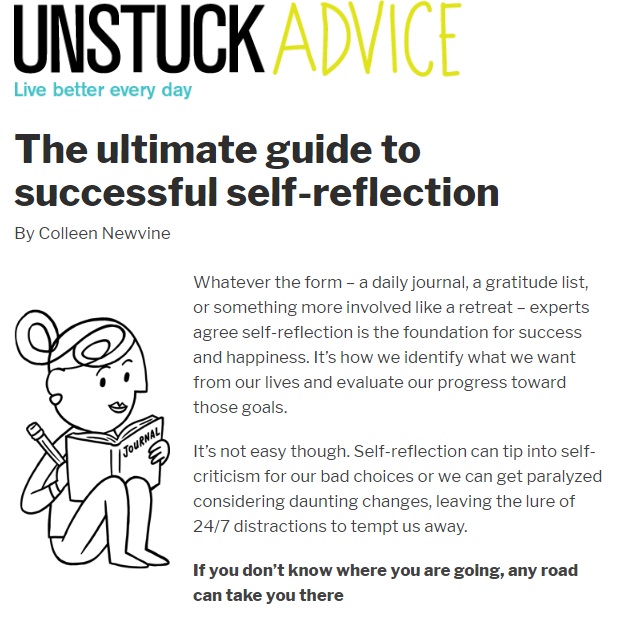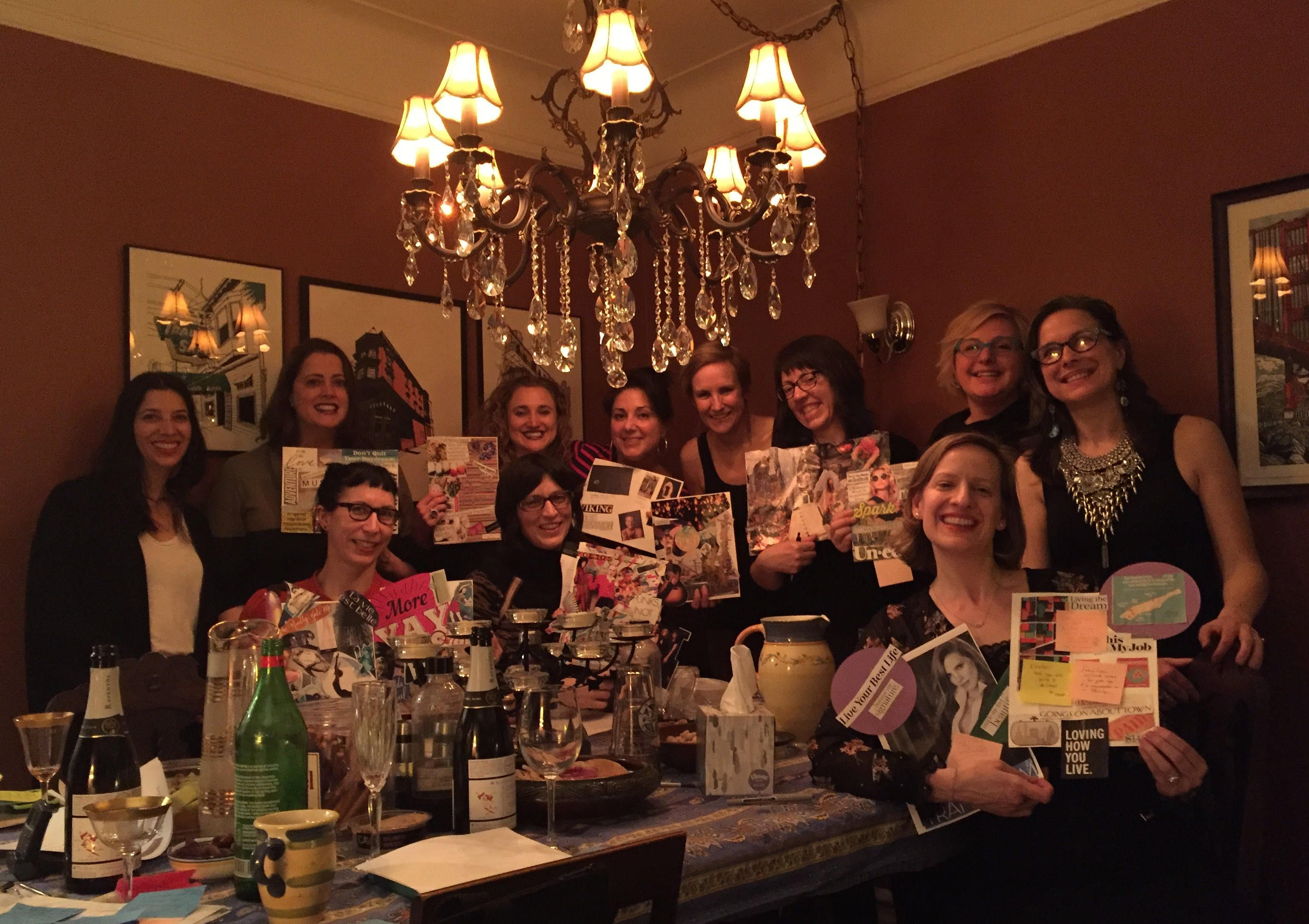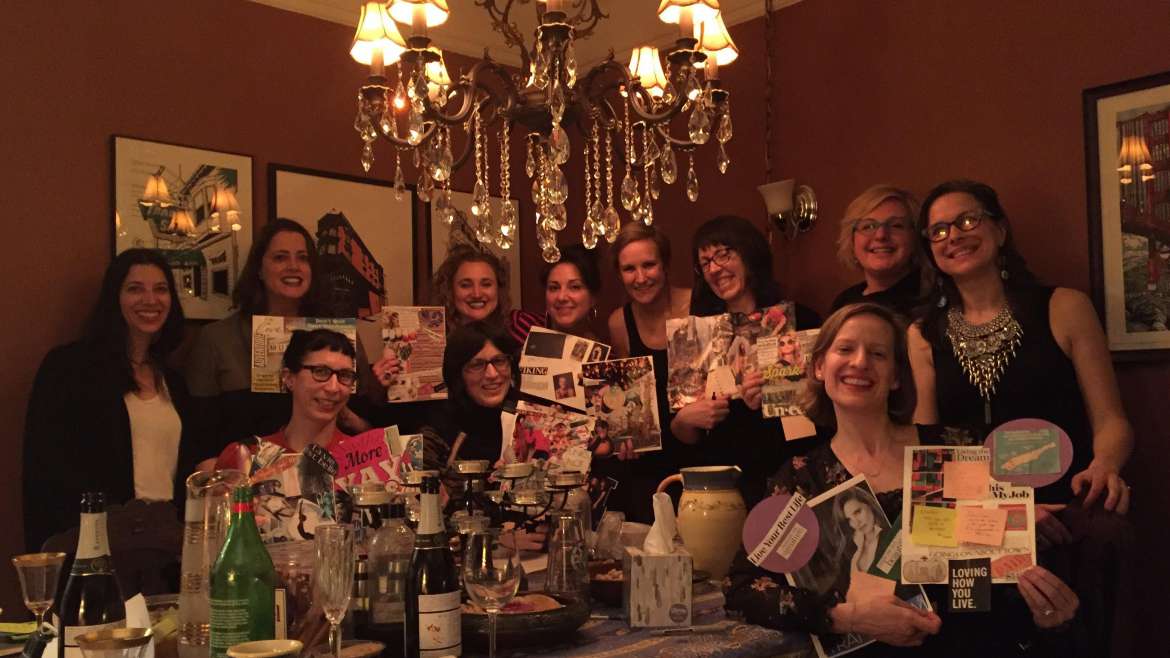Your friend didn’t get nearly as much done as she would have liked today and feels guilty.
Your spouse has gained weight and feels unattractive.
Your child failed a test and feels like a failure.
Would you say, “You’re right, you’re a big loser,” or would you say “I love you no matter what and nobody’s perfect”?
Lately I have been struck by how many conversations I’ve been in where the theme is:
She’s smart and beautiful and fun to be with, and everyone knows that except her.
I’m a big believer in setting goals and I think it’s helpful is to reflect on where I am, where I want to be and what I need to do or change to get from here to there.
But as I wrote in a story for Unstuck, productive self reflection can tip to negative self criticism if you aren’t careful.
Some of the warnings experts gave me about self reflection included:
“If it is done poorly, without awareness, we will go into self-judgment,” said Gary van Warmerdam of PathwayToHappiness.com. “This is in fact what a lot of people think self-reflection is. They look at what they did that day or how they procrastinated and they judge themselves as lazy, unfocused, or wasteful. This kind of beating oneself up emotionally is not self-reflection.”
“Real self-reflection avoids the self-judgment about what we find. This requires a mindfulness state of a neutral observer,” Warmerdam said. “In that state of awareness we can look below the layers of procrastination to the emotions, thoughts, and even beliefs behind the pattern of procrastination. We might find fears of failing, of what others think of us. Or we might find a pressure to get it ‘perfect’ to avoid the fear of failure that there isn’t room to try something.”
“Reflecting is very different than dwelling on something, which can cause greater stress, anxiety, and fear. This is another reason people may avoid reflecting because they don’t know the difference,” said Kim Standeven, life coach, author and speaker. “Reflection is about discovering something new, not replaying a situation.”

It’s not your imagination — you really do see your friend’s situation more clearly than your own.
A recent New York Times article headlined Why You Should Stop Being So Hard on Yourself said:
Evolutionary psychologists have studied our natural “negativity bias,” which is that instinct in us all that makes negative experiences seem more significant than they really are.
In other words: We’ve evolved to give more weight to our flaws, mistakes and shortcomings than our successes.
One of the suggestions experts shared with me is to talk to yourself like a neutral observer.
“It is hard to sit with oneself and really listen to and accept oneself without judging one’s actions. Once we start to judge ourselves, our self talk becomes negative and we remain stuck,” said Kathy Taberner, certified executive coach and co-founder of Institute of Curiosity.
I think it’s a great start to stop beating yourself up and to try to see yourself through more neutral eyes — but even better if you can show yourself the compassion and support you’d give a friend.
This turns out not to just feel better, but it’s actually more productive in reaching your goals.
Imagine a coach talking to a losing team in the locker room at halftime. Is it more motivating if he says, “You’re a bunch of no-talent losers and it’s no wonder you’re getting killed out there!” or “I know you can win this, so let’s turn it around and show them what you’re made of!”
Kristin Neff, associate professor of psychology at the University of Texas at Austin, told Charlotte Lieberman for her essay in the Times:
“Research shows that the No. 1 barrier to self-compassion is fear of being complacent and losing your edge,” Dr. Neff said. “And all the research shows that’s not true. It’s just the opposite,” meaning that self-compassion can lead to greater achievement than self-criticism ever could.
In fact, several studies have shown that self-compassion supports motivation and positive change. In a 2016 study researchers found that “self-compassion led to greater personal improvement, in part, through heightened acceptance,” and that focusing on self-compassion “spurs positive adjustment in the face of regrets.”
“All you have to do is think of going to a friend,” Dr. Neff said. “If you said, ‘I’m feeling fat and lazy and I’m not succeeding at my job,’ and your friend said, ‘Yeah, you’re a loser. Just give up now. You’re disgusting,’ how motivating would that be?”

This is one of the myriad reasons I love our women’s goal-setting sessions. Small groups of women, many of whom didn’t know each other before, sit around my dining table and talk about their aspirations.
When we share the hurdles we think we need to get over to reach our goals, often wrapped in self criticism for not being there already, these smart, accomplished women push back.
No, you aren’t a failure.
No, you don’t need to feel guilty or ashamed.
No, you’re not alone.
It’s not about minimizing their feelings but instead offering an outside perspective, because it can be so easy to fall into the negativity bias. We meet their self criticism with the outside view that says, “From where I sit, you look like you’re doing great.”
If you can, try self reflecting in a way that’s observing your wins for the day and what you could do better tomorrow, whether as a neutral observer or with the love of a friend. If that’s a challenge, reach out to a friend to see how someone else views your situation.

